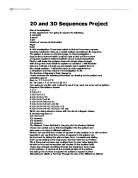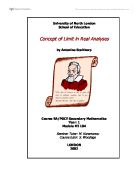The sum of the first n terms of an arithmetic progression is
calculated as
Sn = n ( a1 + an ) / 2 or
Sn = n ( 2a1 + (n - 1)d ) / 2 where an = a1 + (n - 1)d
EX. For the sequence { an } = 1, 3, 5, 7, 9, ..... where an = 2n - 1
an = 2n - 1 = 1 + 2n - 2 = 1 + 2(n-1)
The sequence { an } = 1, 3, 5, 7, 9, ..... is an arithmetic sequence with a1 = 1 and d = 2. The 6th to 10th terms of this arithmetic progression are
a6 = 1 + 2(6-1) = 1 + 10 = 11
a7 = 1 + 2(7-1) = 1 + 12 = 13
a8 = 1 + 2(8-1) = 1 + 14 = 15
a9 = 1 + 2(9-1) = 1 + 16 = 17
a10 = 1 + 2(10-1) = 1 + 18 = 19
The sum of the first n terms of the sequence { an } = 1, 3, 5, 7, 9,. . . is
Sn = n (2(1) + (n - 1)2) / 2 = n (2 + 2n - 2) / 2 = 2n2 / 2 = n2
We can verify this for the first 5 terms:
S1 = 12 = 1
S2 = 22 = 1 + 3 = 4
S3 = 32 = 1 + 3 + 5 = 9
S4 = 42 = 1 + 3 + 5 + 7 = 16
S5 = 52 = 1 + 3 + 5 + 7 + 9 = 25
Geometric Progression
A geometric progression is a sequence in which each term (after the first) is determined by multiplying the preceding term by a constant. This constant is called the common ratio of the arithmetic progression. A geometric progression can be defined as follows:
The geometric progression { an } = a1, a2, a3, ...., an , ....
where n = 1, 2, 3, ....
Its terms are determined by the equation an = a , where
a1 is the first term of the geometric progression
an is the nth term of the geometric progression
n is the term number
r is the common ratio of the geometric progression
The sum of the first n terms of an geometric progression is calculated as
Sn = ( a1 - a1 rn ) / ( 1 - r) or
Sn = ( a1 - an r ) / ( 1 - r) where an r = a1 · rn-1 = a1 rn
EX. In the sequence { an } = 1, 2, 4, 8, 16 , ...., where n = 1, 2, 3, ....
an = (1) 2n-1= 2n-1
Thus, the sequence { an } = 1, 2, 4, 8, 16 , .... is a geometric progression with a1 = 1 and r = 2. The 6th to 10th terms of this geometric sequence is
a6 = 26-1 = 25 = 32
a7 = 27-1 = 26 = 64
a8 = 28-1 = 27 = 128
a9 = 29-1 = 28 = 256
a10 = 210-1 = 29 = 512
The sum of the first n terms of the sequence { an } = 1, 2, 4, 8, 16 , . . is
Sn = (1 - (1) 2n ) / (1 - 2) = (1 - 2n) / (-1) = 2n - 1
We can verify this for the first 5 terms:
S1 = 21- 1 = 1
S2 = 22- 1 = 1 + 2 = 3
S3 = 23- 1 = 1 + 2 + 4 = 7
S4 = 24- 1 = 1 + 2 + 4 + 8 = 15
S5 = 25- 1 = 1 + 2 + 4 + 8 + 16 = 31







